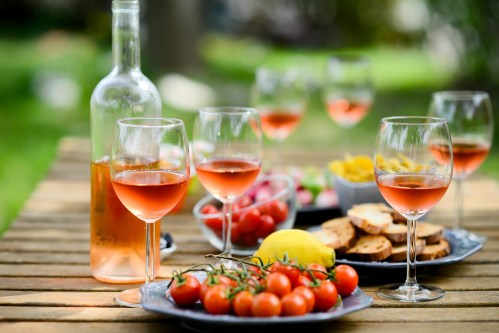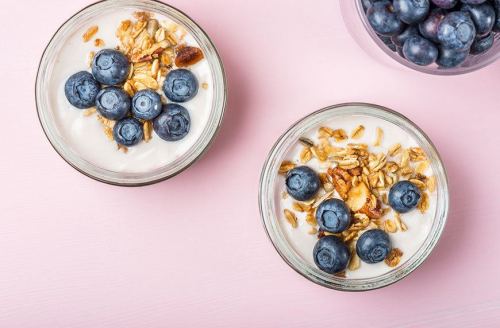Our editors independently select these products. Making a purchase through our links may earn Well+Good a commission
It’s Dry January, and luckily, there are a bevy of beverages at your disposal these days to help you hit your goals, whether you’re going totally dry, or opting for more of a damp January. One of the newer, and buzzier options: Dealcoholized wine. If you’re one of the many who love the taste and vibe of enjoying a glass of vino but aren’t a fan of the headaches, dehydration, and brain fog that can come from a glass too many, dealcoholized wine could sound like an appealing option for you. Or, maybe you’re among the roughly 41 percent of Americans who want to drink less alcohol, according to a 2024 survey by NCSolutions. Whether you’re looking to lower your alcohol consumption or just want some appealing alternatives, , here’s what you need to know about dealcoholized wine, from the experts.
Experts in This Article
a board-certified OB/GYN with Mount Sinai Hospital in New York City
a sommelier based in Washington, DC
What is dealcoholized wine?
Dealcoholized wine, aka alcohol-removed wine, has significantly lower alcohol content compared to regular wine. To make it, vintners go through the classic process of winemaking (i.e., fermentation of grapes with sugar and yeast1) but employ an additional step: Reverse osmosis. “With reverse osmosis, a huge machine [forcefully yet] delicately removes alcohol from the wine to help preserve as much flavor as possible,” says Isis Daniel, a sommelier based in Washington, DC. “It’s a slow process that they’ll run two or three times before reaching an alcohol by volume (ABV) level of 0.5 or below,” which is the limit designated by the Food and Drug Administration (FDA) for a product to be labeled as dealcoholized wine or alcohol-removed wine. (For reference, a standard 5-ounce glass of wine hovers around 12 percent ABV.) Heat is applied to help evaporate ethanol2—and finally, the dealcoholized liquid gets added back to the rest of the wine elements before bottling.
Dealcoholized wine shouldn’t be conflated with alcohol-free wine, aka non-alcoholic (NA) wine. The latter contains no trace of alcohol at any point. The two also differ in both taste and the way they’re made. According to Daniel, there are many different ways to make wine non-alcoholic. “You have musts (i.e., juice from unfermented grapes), and NA wine will usually come from sweet grapes they never added yeast to to create alcohol,” she explains. “Some industry people are reluctant to consider this wine at all because it hasn’t been fermented.”
“Dealcoholization totally changes the chemistry of the wine thus changing the experience, but it’s still an experience for those choosing to drink less or to not drink alcohol.”—Isis Daniel, a Washington DC-based sommelier
What does dealcoholized wine taste like?
Dealcoholized wine is likely to taste a bit different from wine you’re used to, but Daniel says that’s to be expected. “We get texture, body, weight, and aroma from alcohol. Meanwhile, the flavor mostly comes from skins,” she explains. In short, she says that much of the experience is taken away once alcohol is no longer (significantly) present.
Although the taste of dealcoholized wine will ultimately vary according to which variety you choose, you should still be able to get a semblance of a standard taste. Daniel compares it to the many ways in which you can make a chicken—baked versus steamed, air fried versus fried in oil, etc. “It’s a totally different process,” she shares. “Dealcoholization totally changes the chemistry of the wine thus changing the experience, but it’s still an experience for those choosing to drink less or to not drink alcohol.
”All things considered, she prizes dealcoholized sparkling wine as the best of the bunch in terms of taste. “CO2 jumps out of the glass, creating brightness, adding body, and carrying aromas out,” Daniel says. She adds that winemakers do a good job with the acidity and brightness of dealcoholized white wine, but alcohol-removed red wine generally has a way to go on the flavor front.
Does dealcoholized wine have health benefits?
According to Chelsea Clarke, RDN, owner of Balance Chaos Nutrition + Fitness, dealcoholized wine is a worthy alternative to traditional wine. “[Reducing or] taking out the alcohol of any drink is an easy way to make it a healthier choice,” she explains. “Despite myths of the ‘French Paradox’ still circulating today, drinking alcohol even in low to moderate amounts does not have any health benefits.” On this note, Clarke reminds us that alcohol consumption has negative effects on everything from sleep quality and anxiety to hydration and muscle building—not to mention it’s associated with chronic conditions3, such as liver disease, cardiovascular disease, and certain cancers.
But aside from offering a lower concentration of alcohol, there aren’t much health benefits to drinking dealcoholized wine. “Depending on the dealcoholization process used, heart-healthy compounds, such as flavanols, anthocyanins, and resveratrol, can actually increase in concentration due to the removal of alcohol,” Clarke shares. However, even in slightly higher doses, they’re not going to reach meaningful levels to move the needle on your antioxidant count. “Interestingly, resveratrol itself has low bioavailability, and its metabolites—or breakdown products—may potentially mediate any antioxidant effects,” adds Kerry Benson, RD, co-founder of The Sober Curious Dietitians and author of Mocktail Party: 75 Plant-Based, Non-Alcoholic Drink Recipes for Every Occasion.
In addition, opting for dealcoholized wine over the harder stuff may or may not save you calories. “Compared to standard wine, dealcoholized wine is significantly lower in calories. Alcohol contains seven calories per gram, so removing alcohol eliminates a significant amount of the calories in one glass of wine,” Clarke shares. Dealcoholization may also remove sugars; that said, some brands may add more in to enhance the taste of the wine, so there’s a chance you may end up consuming more sugar than you had bargained for. (P.S. In case you need to limit your sugar intake, Clarke says you’re better off seeking out alcohol-free wine with low sugar or no added sugar.)
TL;DR, there’s a time and place for dealcoholized wine… but it’s not exactly ideal for daily consumption. “I’m a big fan of dealcoholized wine, but I don’t recommend that my clients add it to their diet for its health benefits,” Clarke shares. “I often suggest it as a substitute for wine or alcohol in certain social situations, or if a client has a habit of pouring a glass to unwind after work or while making dinner.”
Is dealcoholized wine safe during pregnancy?
Cynthia Abraham, MD, FACOG, a board-certified OB/GYN with Mount Sinai Hospital in New York City, cautions against pregnant women drinking dealcoholized wine. “There still may be traces of alcohol, and the amounts of alcohol content on the manufacturer labels may underestimate the actual content,” she warns. “There are also no studies evaluating the safety of dealcoholized wine in pregnant women and/or nursing mothers.” As such, she suggests erring on the side of caution by skipping over these drinks—or, at the very least, consulting your medical team before imbibing.
If you’re nursing, Dr. Abraham says that a moderate intake of these drinks is unlikely to pose harm. To play it safe, however, she recommends delaying breastfeeding for at least an hour after drinking dealcoholized wine (FYI, the Centers for Disease Control and Prevention recommend nursing folks avoiding breastfeeding two to three hours after enjoying a regular alcoholic drink).
Should anyone else avoid drinking it?
According to Benson, those who need to abstain from alcohol entirely—including those who are pregnant or trying to conceive, have certain medical conditions, and take certain medications—are better off skipping dealcoholized wine. “Anyone who is in recovery from addiction or substance use disorder who finds that drinking a close substitute to wine might be triggering or would put their sobriety in jeopardy should [also] avoid dealcoholized wine,” Clarke warns.
In addition, the dietitians rule out dealcoholized wine for those who:
- Are sensitive to sulfites, histamines, or tannins, since dealcoholization doesn’t remove these compounds
- Are on monoamine oxidase inhibitors (MAOIs), since dealcoholized wine may still be high in tyramine
“A truly alcohol-free drink that never had alcohol to begin with is the safest choice and best option for individuals who need to abstain from alcohol completely,” Benson says.
Ready to try dealcoholized wine for yourself? Try these W+G favorites

Oddbird Red Wine $25

Fre Sparkling Brut, Alcohol-Removed $15

Sovi Reserve Red $42
Maicas S. The Role of Yeasts in Fermentation Processes. Microorganisms. 2020 Jul 28;8(8):1142. doi: 10.3390/microorganisms8081142. PMID: 32731589; PMCID: PMC7466055.
↩︎Sam FE, Ma TZ, Salifu R, Wang J, Jiang YM, Zhang B, Han SY. Techniques for Dealcoholization of Wines: Their Impact on Wine Phenolic Composition, Volatile Composition, and Sensory Characteristics. Foods. 2021 Oct 18;10(10):2498. doi: 10.3390/foods10102498. PMID: 34681547; PMCID: PMC8535880.
↩︎Sterling SA, Palzes VA, Lu Y, Kline-Simon AH, Parthasarathy S, Ross T, Elson J, Weisner C, Maxim C, Chi FW. Associations Between Medical Conditions and Alcohol Consumption Levels in an Adult Primary Care Population. JAMA Netw Open. 2020 May 1;3(5):e204687. doi: 10.1001/jamanetworkopen.2020.4687. PMID: 32401315; PMCID: PMC7221504.
↩︎
Sign Up for Our Daily Newsletter
Get all the latest in wellness, trends, food, fitness, beauty, and more delivered right to your inbox.
Got it, you've been added to our email list.










